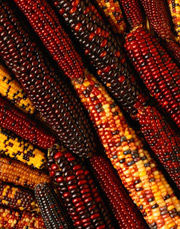Global warming's local crop impacts forecast--New climate model suggests the devil is in the variability.
Nature14 May 2003 TOM CLARKE
 Some maize crops could collapse while nearby plots thrive.
© Getty Images
Some maize crops could collapse while nearby plots thrive.
© Getty Images
A new technique that can estimate local weather patterns 50 years from now could help poorer countries to prepare for shifts in agricultural productivity.
"We hope to get to the point where, at the household level, we can decide which crops and livestock are most suitable for future climatic conditions," says economist Phillip Thornton of the International Livestock Research Institute in Nairobi, Kenya.
Previous studies estimated the impacts of climate change on continents or countries, rather than at finer scales. "We will need to have these kinds of analysis for the future," agrees land-use expert Mahendra Shah of the International Institute for Applied Systems Analysis in Laxenburg, Austria.
With colleague Peter Jones at the International Centre for Tropical Agriculture in Cali, Colombia, Thornton has devised a statistical tool called a synthetic weather simulator. The duo link this to a standard model that forecasts global climate change1.
Fed with ten years' worth of rainfall data from thousands of weather stations in Africa and South America, the simulator predicts the probability of future rainfall within 18-kilometre squares throughout the continents. "It won't tell you whether it's going to rain or not, but it will tell you what should be characteristic weather for that site," says Thornton.
The researchers link this model to another that predicts how well maize, a developing world staple, grows depending on sunlight, temperature, rainfall and soil type.
The system predicts a 10% average decrease in maize production by 2055, which could, in theory, be compensated for by improved crop varieties and farming technologies.
More alarmingly, the study suggests that some areas that are now producing tonnes of maize might not produce any 50 years from now. "It's the variability that's going to have the impact," says Thornton. "Some places will be absolutely devastated."
Some areas of the Ethiopian highlands, for example, could have bumper maize crops by 2055 whereas others next door, which are now very productive, could yield next to nothing. Venezuela may have to shift its maize production from the north to the southwest of the country, which does not currently support the crop.
It's very early days for trying to predict future weather patterns from one valley to the next, stress climate researchers. There are five leading Global Climate Models (GCMs) - none perfect, all different. This latest study uses just one. "The work would really need to be repeated using other GCMs to remove uncertainty," says climate modeller Geoff Jenkins at the Hadley Centre for Climate Prediction and Research in Bracknell, UK.
Better techniques for integrating local weather predictions with GCMs will also be needed, admits Thornton. "But we are getting to the stage when we can really zoom in," he says. The next iteration of their system should be accurate to a 10-km-square scale, he reckons.
Statistics aside, says Shah, the situation on the ground is always more complex. Maize is grown twice a year in many parts of Africa and is often planted beside other crops. "The reality is multiple cropping," he says. The impacts of climate change on those crop yields will be even harder to predict.
References
- Jones, P. G. & Thornton, P. K.The potential impacts of climate change on maize production in Africa and Latin America in 2055. Global Environmental Change, 13, 51 - 59, (2003). |Article|
© Nature News Service / Macmillan Magazines Ltd 2003
• Rain kills reindeer 10 March 2003 • Warming planet shifts life north and early 6 January 2003 • Climate to change wildlife 11 April 2002 • Link between climate and malaria broken 21 February 2002 • Climate widens the gulf 10 July 2001 • CGIAR • Feedback could warm climate fast 23 May 2003 • Sperm chip sorts movers from shakers 23 May 2003 • Hope for Alzheimer's vaccine 22 May 2003 • Copied citations give impact factors a boost 22 May 2003 • Science nets Chelsea gold medal 22 May 2003